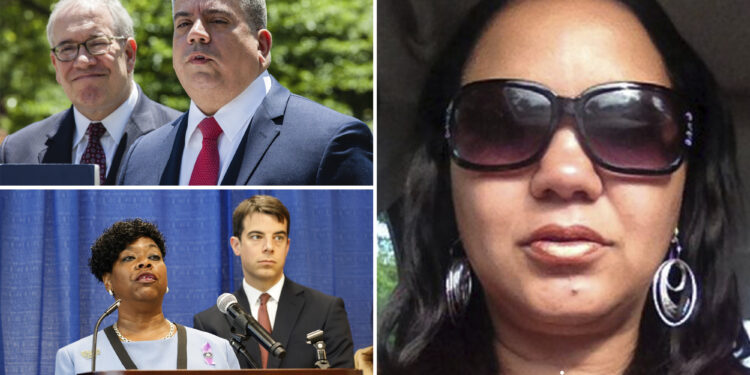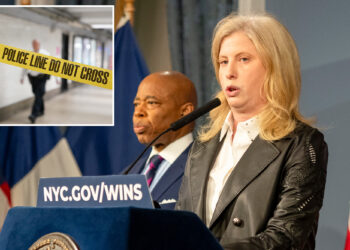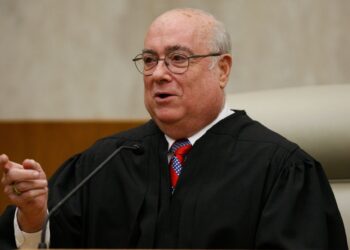
Brooklyn District Attorney Eric Gonzalez awarded his former chief of staff a $15,000 bonus — despite fielding numerous complaints that she bullied underlings and trashed Jewish staffers, The Post has learned.
Maritza Ming received the generous one-time payment on top of her $208,849 salary in FY 2022-23, bringing her total take-home pay to $223,849, and making her one of the two highest-paid people in the office.
With the hidden taxpayer-funded bonus, Ming, 51, made more than her boss, Gonzalez, who collected $212,217. He did not take a bonus.
“The insults never stop,” a disgusted Brooklyn staffer said of Ming. “It’s actually insane especially since she hasn’t even been in the office.”
Ming has been on paid leave for six months since July 29, when The Post reported misconduct allegations against her, including the misuse of office personnel and cars for her own benefit.
She did not reply to a request for comment, and Brooklyn spokesman Oren Yaniv would not address her absence or bonus. Gonzalez has hired an outside consultant to review the office’s handling of discrimination complaints.
But Yaniv acknowledged that the DA’s office, which has 983 employees, gives yearly bonuses.
“DA office salaries are generally lower than those in other city agencies. We responsibly use bonuses to address this disparity and fairly compensate our dedicated staff when our budget allows,” he said.
Besides Ming, about 20 other Brooklyn DA execs got one-time payments of $5,000 to $15,000 in FY 2022-23, according to city payroll records provided by the watchdog Empire Center for Public Policy.
The bonuses for each staffer are lumped in with other one-time payments, which total more than $32 million across the offices of the five district attorneys and the special narcotics prosecutor. Other one-time payments may include back pay, cash for opting out of health insurance, unused leave, severance and various perks.
Last month, most of the Brooklyn DA staff received $1,000 as a “holiday bonus,” an insider said, adding that executives received up to $6,000.
The bonuses are shrouded in secrecy. The DAs of each borough, and the special narcotics prosecutor, refused to divulge their total payouts, but several justified handing out the extra cash as a way to retain staff.
In testimony before the City Council’s public safety committee in March, Bronx DA Darcel Clark said her borough has 17% of the Big Apple’s population, but 30% of the crime.
The Bronx experienced a rise in violence in 2022 with 131 killings, including 83 by guns; 401 people wounded by gunfire; and 1,323 arrested for gun possession, she said. But her office often dropped the charges because she lacked the staff to prosecute them.
“Our dismissal rate for felony cases has risen 18%” — to half of all felonies, she said.
Clark blamed staff attrition — a loss of 152 lawyers in 2022 — on low pay and heavy workloads due to recent discovery laws demanding that prosecutors turn over massive amount of evidence to the defense in a short time period.
She cited bonuses as way to stave off a threatened walkout in November 2022.
Last fiscal year, Clark awarded one-time payments of $3,000 to $12,000 to her 1,248-employee staff, records show.
The Bronx bonuses have come under scrutiny. A 2021 audit by former City Comptroller Scott Stringer found the DA failed to document $199,710 in bonuses paid to 21 employees in a sample of 41. Auditors could not determine whether the bonuses — an average $9,510 each — were merited and properly calculated according to the DA’s own performance metrics, which were not detailed.
In Manhattan, soft-on-crime DA Alvin Bragg doled out many one-time payments of at least 1,000 to $5,000, records indicate.
Bragg ignited controversy with his first-day memo in January 2022 when he advised staff against seeking jail time in all but the most serious crimes, but a month later reversed himself after a public backlash, taking a tougher stance on gun possession and robbery.
Staten Island DA Michael McMahon joined his fellow prosecutors in asking the City Council for a 25% increase in staff salaries, noting that lawyers fresh out of school make $215,000 a year in private firms.
Salaries for assistant district attorneys start at about $75,000 for recent law school graduates, and range up to $160,000 or higher, depending on experience.
“The attorneys in our office have evening obligations, weekend obligations, long days, trial readiness, doing the trials, and they never are given any overtime salary,” he said.
Staten Island DA employees received one-time payments of 1,000 to $3,000.
Queens DA Melinda Katz also favors bonuses.
“As they are not a recurring expense, modest bonuses, when feasible, can be a cost-effective way to retain top prosecutors and key support staff without incurring a repeating budget impact,” a spokesman said.
Queens DA bonuses appear to range from $1,000 to $12,000, with higher-paid managers and executives taking home the most, records suggest.
DA spokesmen will not explain any criteria for awarding the one-time payments.
“Knowing that executives are getting such large bonuses would drive the rank-and-file mad,” a Brooklyn DA insider said. “If that comes out there will be a mutiny. It’s unclear what many of the execs do.”
The City Council, which approves the DA budgets, and the city comptroller’s office cannot account for the bonuses, saying they have no control over the payouts, spokespersons said.
City Councilman Robert Holden (D-Queens) a member of the public safety committee, told The Post he doesn’t oppose bonuses for DA staff who “make peanuts.”
But Holden was alarmed that the DAs, who have pleaded for millions of dollars in increased funding for staff and technology, find enough money to pay bonuses.
“District Attorney staff are overwhelmed, under-compensated, and navigate a justice system that favors criminals,” he said. “Bonuses are always good, but the focus should be on increasing the headcount, which is crucial to prosecute cases and secure convictions effectively.”

























